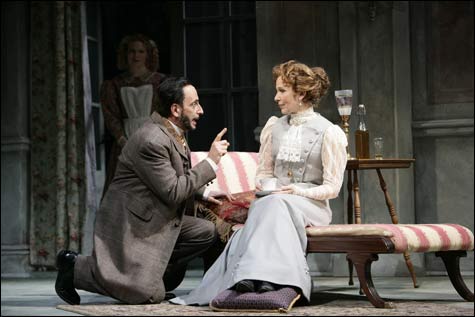The Cherry Orchard; Brontë; Sailing Down the Amazon and Haiku
By CAROLYN CLAY | January 17, 2007

THE CHERRY ORCHARD: Resonating with the rhythms of the languid gentry of turn-of-the-20th-century Russia. |
There’s not a samovar in sight, and American playwright Richard Nelson has sharpened and pared down the script. Yet the Huntington Theatre Company staging of Anton Chekhov’s The Cherry Orchard (at the Boston University Theatre through February 4) feels Russian — particularly compared with Curt Columbus’s funny, poignant, and very American adaptation of the work for Trinity Repertory Company last fall. Translator Nelson and director Nicholas Martin see the linchpin of the play as personal: its seemingly flighty heroine, Ranevskaya, must confront the guilt and sorrow triggered by the death of her young son in order to move beyond the cherry orchard, symbol of innocence and happiness lost, to a new life. Indeed, Martin tells the Phoenix, “You can never make a play this great about politics.” Yet the fleet period staging at the Huntington resonates with the rhythms of a quite specific society, the languid gentry of turn-of-the-20th-century Russia, marching toward what scholar Laurence Senelick calls “the inexorable expulsion.”This is one of the Huntington’s big-gun productions, with artistic director Martin at the helm, Tony-nominated Hedda Gabler star Kate Burton’s name above the title, and an impressive contingent of Broadway vets (including Tony winner Dick Latessa as superannuated Firs) and A-list locals on stage. Michael Friedman has composed some ravishingly melancholy music and Ralph Funicello has designed a magisterial mausoleum of an old-estate set before and behind which comings and goings bustle and the mad mourning party of the third act unfolds — and which devolves in act two to a birch wood picturesquely set with gravestones. And there are cherry trees (there weren’t at Trinity), projected on a delicate proscenium-hung scrim, in blossom and in fruit and gone fallow as the orchard and its impractical idolaters progress toward not just ejection from Eden but also the clearing of Eden for the summer cottages lowborn financier Lopakhin can’t shut up about.
Written in 1903, The Cherry Orchard is Chekhov’s final masterpiece and the one that perhaps best balances pathos with a sense of the absurd. (The end is both symbolic and positively Beckettian.) It has been said that all of the play’s characters are like children, but none is more so than the middle-aged Ranevskaya and her brother Gaev, aptly wandering the room that was once their nursery as they doggedly ignore the bell that’s tolling for their serf-served, mid-19th-century way of life. Burton, regally costumed by Robert Morgan, is a Ranevskaya alternately fragile (dissolving into the arms of her dead son’s tutor), theatrical (wallowing affectedly in nostalgia), scatterbrained (giving gold to a tramp when she herself is destitute but for the finery on her back), and compulsively impulsive (suddenly flaring up at the same perpetual student). But the actress put her own memorably acerb stamp on Hedda; her Ranevskaya is less distinctive. As the character’s equally inefficacious brother, Mark Blum, launching into sentimental encomiums to old furniture, is ridiculous, yes, but also more urbane than you might expect a provincial Russian to be. In some ways he’s less childlike than Will LeBow’s dandified, sometimes lurchingly coarse, yet puppy-like Lopakhin, who, drunk, can contain neither his delight at buying the estate on which his progenitors were slaves nor a boorish need to drive home his triumph over the gentry.
 Related
Related:
Rethinking Chekhov, Boston theater season announced, 2009: The year in theater, More 
- Rethinking Chekhov
Conventional wisdom and introductory drama classes describe Anton Chekhov’s final masterpiece, The Cherry Orchard , as a prescient statement about his country’s future, written in 1903 as the playwright was dying.
- Boston theater season announced
Boston’s biggest theatrical guns have announced what they’ll be showing next season, and it isn’t all Annie and Aeschylus .
- 2009: The year in theater
A quick look at this past year in Boston's theater scene.
- Winter's tales
The cold season heats up on Boston boards
- A winter’s tale
Even as the family drama of your holiday comes to a close, there’s no need to don a kerchief and settle in for a long winter’s nap.
- Review: The Seagull, The Corn Is Green
The Seagull begins with a theatrical experiment — a brief symbolist drama dreamed by young Konstantin Treplev, who's struggling toward artistic expression while endeavoring to showcase his girlfriend and impress his actress mother.
- New blood
The famously adventurous American Repertory Theatre is soon to be taken over by a woman who spent her summer directing . . . the vintage Broadway hits Kiss Me, Kate and Hair ?
- Play by Play: February 6, 2009
A compilation of theater productions in and around Boston
- Less

 Topics
Topics:
Theater
, Entertainment, Business, Kippy Goldfarb, More  , Entertainment, Business, Kippy Goldfarb, Anton Chekhov, Jean Rhys, Kate Burton, Anne Bronte, Charlotte Bronte, Richard Nelson, Alicia Kahn, Less
, Entertainment, Business, Kippy Goldfarb, Anton Chekhov, Jean Rhys, Kate Burton, Anne Bronte, Charlotte Bronte, Richard Nelson, Alicia Kahn, Less 